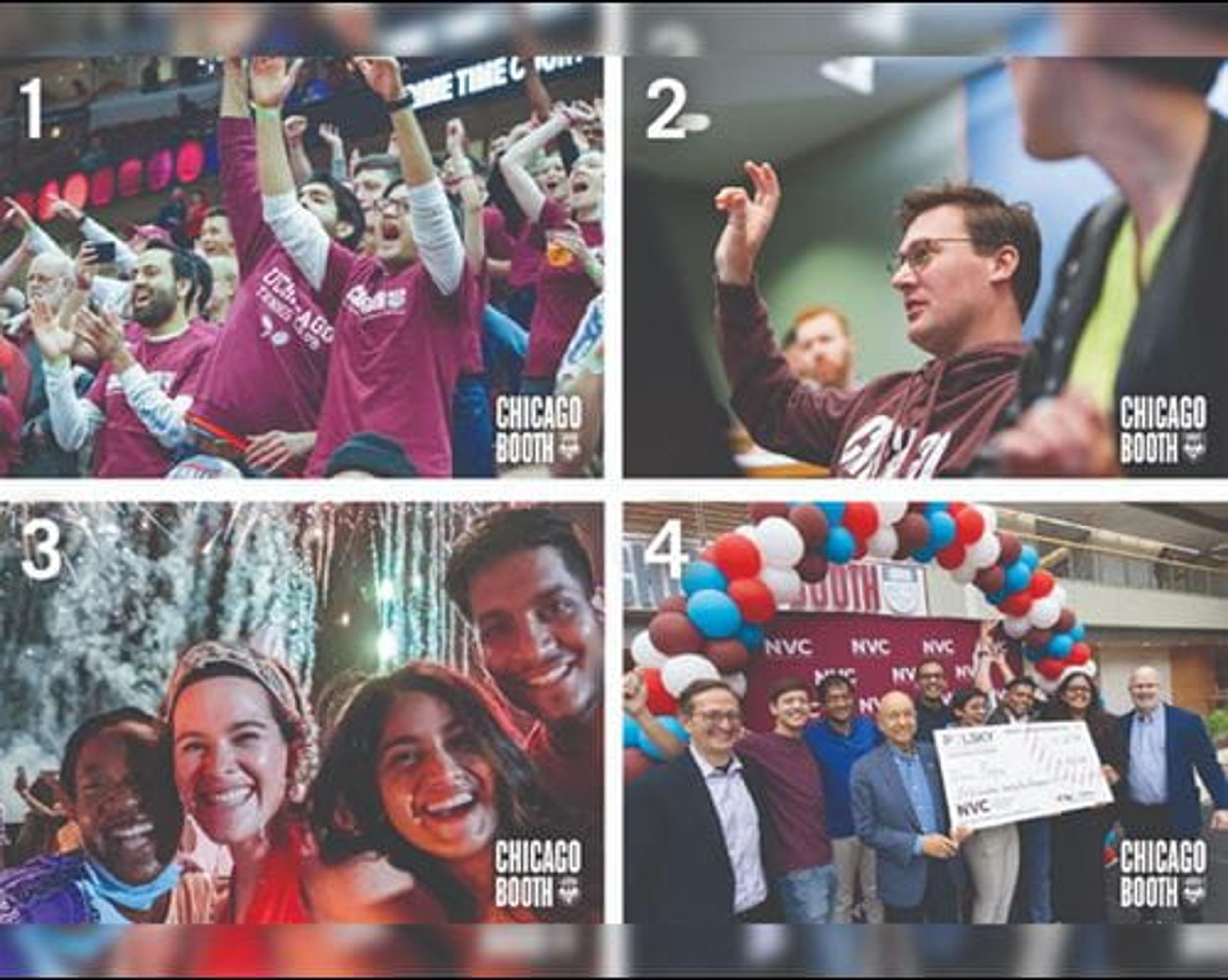Booth MBA Essays: Analysis & Tips From a Former AdCom (2025)
Tips and tricks to help you write the best essays possible for the Booth MBA Application, including expert advice from a former Booth adcom.

By Faisal K.
Posted July 22, 2025

Table of Contents
Applying to the Chicago Booth MBA program? You’re in the right place. I’m a former Admissions Officer at Booth and have spent 15+ years helping applicants craft compelling, strategic MBA applications that get results. I’ve read and evaluated hundreds of Booth essays from the other side of the table, and coached over 100 candidates into top MBA programs including Booth, Harvard, Kellogg, and Wharton. I know what works, what doesn’t, and what makes an applicant truly stand out to the Booth Admissions Committee.
This guide goes beyond generic essay advice. Whether you're aiming to launch a fintech startup, pivot into clean energy, or deepen your strategic leadership in a corporate setting, this article will help you understand what Booth is actually looking for – and how to write essays that reflect your unique intellectual DNA and values as a leader.
Chicago Booth MBA Essays – Prompts & Analysis (2025)
Arguably, the most important part of any MBA application, essays give applicants the chance to present different personal qualities. Unlike resumes, GPAs, and recommendation letters, the essays are purely in your voice and provide a forum for you to showcase your charisma and reasons for applying to Booth. Here are the two Booth essay questions, along with my interpretation of them.
Essay 1
Prompt: How will a Booth MBA help you achieve your immediate and long-term post-MBA career goals? (250 words minimum, no maximum)
Be warned: Booth is not looking for a list of the things that you are going to accomplish. They want clear thinking, a logical trajectory, specific goals that are tied to a well-researched and evolving plan, and – most importantly – a direct link between your aspirations/needs and Booth’s resources. The prompt isn’t asking why an MBA will help you achieve your goals; it’s asking how a Booth MBA will help. Mention Booth-specific resources that, again, make sense in the context of your career. But don’t just state them, explain how they will help you fill a gap in your skillset or plan.
Essay 2
rompt: Chicago Booth appreciates the individual experiences and perspectives that all of our students bring to our community. This respect for different viewpoints creates an open-minded environment that supports curiosity, inspires us to think more broadly, and take risks. At Booth, community is about collaborative thinking and learning from one another to better ourselves, our ideas, and the world around us. The photos below represent some of the values described above that we uphold at Chicago Booth. Select one and share how it resonates with one of your own values. (250-word minimum)

This is the one primary spot you have to show the admissions committee not what you’ve done/are going to do, but who you are as a person. They want to see self-awareness, authenticity, values-based storytelling, and a look at your non-professional life. Do not regurgitate your resume – that’s the worst possible use of this space.
Pro Tip: Think about “moments of transformation” in your life – when you challenged yourself, changed direction, or discovered something unexpected. Think back on all the major decisions of your life thus far. Why did you make the decision you did? Stories that reveal emotional intelligence can often be powerful.
How Long Should the Booth Essays Be?
Both of the Booth essay questions are relatively open-ended, which can be especially difficult because of the unlimited word count. Regarding the essay guidelines, Booth says that it trusts “that you will use your best judgment in determining how long your submission should be, but we recommend that you think strategically about how best to allocate the space.”
Though each applicant is unique, it’s generally recommended that you keep the essay lengths to about 500 words each. You don’t want to bore or waste the AdCom’s time, and you also want to show that you can get to the point clearly and succinctly.
What is Booth Really Looking For?
Before we get into tactical tips, first a moment for what the school is looking for in these essays and in prospective Boothies. Booth’s application process is designed to uncover how you think, not just what you’ve done. It’s one of the few MBA programs that doesn’t set a strict word limit for its essays because they want to see your judgment, clarity, and ability to make ideas stick.
Here are some of the characteristics they want to see in applicants, and what you should be thinking about when brainstorming and writing your essays:
- Intellectual curiosity and rigor – Booth is an idea lab. It attracts people who question assumptions, enjoy data-driven debate, and are willing to update their thinking when presented with better evidence. Your essays should reflect a love of learning, not just a desire to win.
- Self-awareness and independence – With its famously flexible curriculum, Booth is not for hand-holders. The Admissions Committee wants to see that you can define your own path, recognize your own gaps, and seek out the right challenges to grow.
- Comfort with ambiguity and contrarian thinking – Many of Booth’s most successful graduates weren’t the loudest or flashiest, they were the clearest thinkers. They’re not afraid to go against the grain. Show how you’ve taken unpopular stances, asked hard questions, or pursued uncommon paths.
- Leadership through insight, not ego – Booth values “quiet confidence,” not self-promotion. Essays that show how you think about leading, how you’ve impacted others, and what you’re still learning about yourself will resonate more than a string of big wins.
As with all MBA essays, the point is not to list your strengths but to use stories to show – not tell – how you innately have these qualities and how they’ve shown up in your life. If you want to dive deeper into how you can do this in your application, I’m happy to help.
How to Nail Your Booth MBA Essays
1. You should know, and be able to clearly articulate, why Booth is the best school for you.
With the first essay prompt, Booth wants to know that you understand the specificities of its MBA program. It also wants to understand why you’d like to attend Booth instead of all the other business schools. Notice that the prompt is not asking how an MBA will help you in your career goals but how a Booth MBA will help them.
As part of this research, I recommend taking an in-person or virtual campus tour, speaking to alumni, watching videos, and/or reading blog posts. Answers to this question may also include specific classes you want to take or professors you want to take them from, or on-campus clubs/groups that you’d like to join.
Pro Tip: Booth has a long tradition of influencing economic thought. What are its professors currently studying? What are they saying on their podcasts about the state of the economy today? Where are its alumni who graduated 10-15 years ago working? All of these are great places to dive deeper into your Booth research and connect it to your background/goals.
2. Take time to reflect and understand how an MBA and Booth realistically fit into your career and life trajectory.
Pivotal to many parts of the MBA application, but especially the essays, Booth wants to understand your dreams and how you’re planning on using an MBA to achieve them. In order to answer this question well, you must have a clear idea of your motivations for pursuing an MBA and where you see your career going after graduation. Also, reflect on your career journey thus far, including what you have learned in previous roles and what is lacking
To get started, I recommend that you talk with a peer or mentor to outline this. Have them ask you important questions such as:
- Where do you see yourself in five years? Ten years? Twenty years?
- Why do you want to pursue an MBA? Don’t give me the answer you would to an admissions officer. Tell me what you would tell a loved one or a friend.
- How do you plan on making an impact at your current or future workplace? What big problem are you solving?
- What are your professional and personal goals? Why can’t you get there without an MBA?
3. Make sure you’re answering the question.
Booth’s essay prompts are notoriously broad and it can be difficult to stay on one narrative without straying to irrelevant topics. This difficulty is exacerbated by the lack of a maximum word count, which trips up a lot of applicants. I advise people this way – if your life can be made into a Hollywood movie starring an A-list actor, then by all means, go all out. For everyone else, aim for something under 700-750 words.
To prevent tangential asides, plan the outline of your essay before you begin writing a draft. Having an idea of the overall structure while you write will help you stay on track, improve the structural flow, and remain clear and concise throughout. Before you begin the draft, reread the essay question to make sure that you’ve addressed each part. For example, the first question asks about immediate goals and long-term goals. Have you mentioned both in your outline?
Pro Tip: Make every word and sentence count. If you are saying the same thing in different ways, then that’s a great sign that you should remove that content. Often, it’s a lot easier to cut words than it is to write but be ruthless in your edits. Words are precious and each one should serve a purpose.
4. Differentiate, differentiate, differentiate.
The Booth Admissions Committee will read thousands of essays and your job is to make yours stand out. What makes you different from every other MBA applicant? Whatever it is, highlight it. Think about the experiences that have made an impact on you and create a story that leads to Booth. As mentioned earlier, stay on topic. Choose stories that are relevant to the characteristics you’re trying to highlight. You have limited space and you want each part of the essay to build on the last so that the whole thing is fluid and logical.
On its website, Booth says that it wants “ambitious, intellectually curious professionals” and “bold leaders.” While writing your essay, think about how you can show that you possess these traits in the stories. To get started, we recommend answering the following questions:
- When have you challenged yourself (or others) to do something in a different way?
- How do you learn? Where do you go to get your information?
- What events/experiences/people have shaped and challenged you as a person?
- What matters most to you?
- What motivates you? What are your values and where did they come from?
Once you’ve written your answers to these questions, think about the stories that come with them and look for themes that tie the major events together. This will give you a good start on the outline.
5. Start as early as you possibly can.
I recommend that you begin outlining and drafting your essays early to give yourself ample time to review them and receive feedback – it will almost certainly take longer than you think. Your first draft should not be your final submission. Start brainstorming at least three months before the application deadline. Once you have a draft, leave it for a few days so that when you come back to it, you are reading it with a fresh perspective.
After you’ve made edits, have a peer or mentor review it, ideally a Booth alum or someone with extensive writing experience. If, when you have come back to it, you are confident in its caliber, review it one more time with a coach or mentor before submitting it.
Booth Essay Mistakes to Avoid
I see a lot of candidates, even very strong applicants, fall into a couple of different traps. The first is writing overly generic MBA goals without clarity or credibility. If your goals could be copied and pasted into a Kellogg or Wharton app, they’re not Booth-specific enough. Booth wants to see evidence that you’ve thought carefully about how this specific program fits into your plan. On the latter point – credibility – your goals need to make sense for your background and who you are as a person. The admissions officers need to be able to look at your application and think, “Oh, yeah, I think this person is going to do what they say they are.”
The second common mistake I see is very soulless or overly-polished writing. From sitting on the other side, I can tell you that it’s easy to know when applicants are trying hard to sound impressive or are inauthentic. This is the one part of your application where you can show the human you – don’t lose that opportunity.
The last trap is underinvesting in the second essay. A lot of applicants treat the “who you are outside of work” prompt as an afterthought. In reality, this is where your personality, values, and motivation come alive. Don’t be afraid to dig deep and get personal.
Final Tips From a Former Booth AdCom
After years of reading Booth essays and helping applicants with their essays, here’s what I tell every one of my clients:
- Think in frameworks, but write in stories. Booth loves structured thinkers, but not robotic writing. Show you can analyze complexity, but let your story flow like a conversation, not a consulting slide.
- Use specificity as a shortcut to authenticity. Skip vague phrases like “global leader” or “data-driven innovation.” Instead, say exactly what problem you want to solve, who’s affected by it, and how you plan to contribute, both inside and outside the classroom.
- Leave room for humility. The best Booth essays aren’t just about success: they show growth. Share a moment when you changed your mind, asked for help, or took a risk and learned from it.
- Don’t try to impress Booth – try to connect. Booth doesn’t want perfection. It wants thinkers, builders, researchers, mentors, challengers. Your job is to show that you're not only ready for Booth, you'll add something unique to its class.
The Bottom Line
Booth isn’t looking for cookie-cutter candidates – it’s looking for people with clarity, curiosity, and courage. If you want to stand out, don’t just write about what you’ve done; show how you think and who you are. Let your essays reflect your values, your intellectual energy, and your vision for how you'll grow at Booth and beyond.
These essays aren’t just another admissions document: they’re your one chance to take ownership of your story and define the kind of leader you want to become. Whether you're driven by problem-solving, innovation, or impact, Booth will give you the flexibility to chart your own path. Your job is to show why you’re ready for that challenge, and how you'll leave your mark.
If you’d like help figuring out your Booth application strategy or essay topics, brainstorming/writing your responses, and putting together a stellar application, book a free intro call on my profile. I’d love to help you figure out how to show Booth that you’ll be an exceptional MBA candidate.

Booth MBA Essays – FAQs
How important are the Booth MBA essays in the overall application?
- Extremely important. At Booth, the essays are a critical part of the holistic review process. They give you the chance to demonstrate strategic thinking, self-awareness, and alignment with Booth’s values in a way your resume or test scores can’t. The AdCom reads these closely to assess how you think — not just what you’ve done.
Is there a word limit for the Booth MBA essays?
- No — Booth doesn’t set a maximum word count. But that doesn’t mean you should ramble. Aim for ~500–750 words per essay unless you truly need more. The best responses are clear, purposeful, and make every sentence count.
What should I write about in Booth’s second essay?
- Use Essay 2 to show who you are outside of work. Focus on personal experiences, values, and formative moments. Booth wants to know what motivates you, how you’ve grown, and what kind of classmate you’ll be. Avoid repeating your resume — this is your chance to be authentic and memorable.
How can I make my Booth essays stand out?
- Booth values intellectual curiosity, contrarian thinking, and quiet confidence. Stand out by showing how you think, not just what you’ve achieved. Use specific, personal stories that demonstrate self-awareness, leadership through insight, and a clear fit with Booth’s flexible, data-driven culture.

Written by Faisal
5.0
(72)
As part of the University of Chicago Booth School of Business Admissions team, I reviewed hundreds of applications and learned what distinguished the successful candidates from those who were merely qualified for admission. I also obtained my MBA from Booth and have professional experiences in management consulting, tech, and the healthcare sectors. My focus in each sector was always marketing and strategy, helping each business stand out from its competition. Along the way, as I began helping friends and acquaintances gain admission to their top choice programs, I realized I had a passion for teasing out a person's story to highlight what separated them from the herd. I dove in to making admissions consulting a bigger part of my life, and have never looked back! I spend the bulk of my time with my clients helping create a framework for their stories. Where have you succeeded? Where have you failed? What excites you? What's different about you? My clients describe the work that I do as part admissions consulting and part executive coaching. The skills I impart help not only with creating an MBA application, but also with refining career goals and objectives. A lot of coaches promise to deliver, but you can verify my claims by looking at what former clients have said about me on Leland and at https://poetsandquants.com/consultant/faisal-khan/?pq-directory-type=consultant, where I have testimonials from clients admitted to all Top 10 schools and with over $5MM in combined scholarship grants, including full rides. As an MBA coach, it's not enough to simply have graduated from a top business school. As an active member of AIGAC - our global, governing body - I make sure to stay in close communication with the admissions teams at all of the top business schools. This is how a coach ensures they have the most up-to-date information about each business school's goals and objectives for the year, and can in turn help you craft an application that speaks to these.
Faisal has helped clients get into organizations like:















